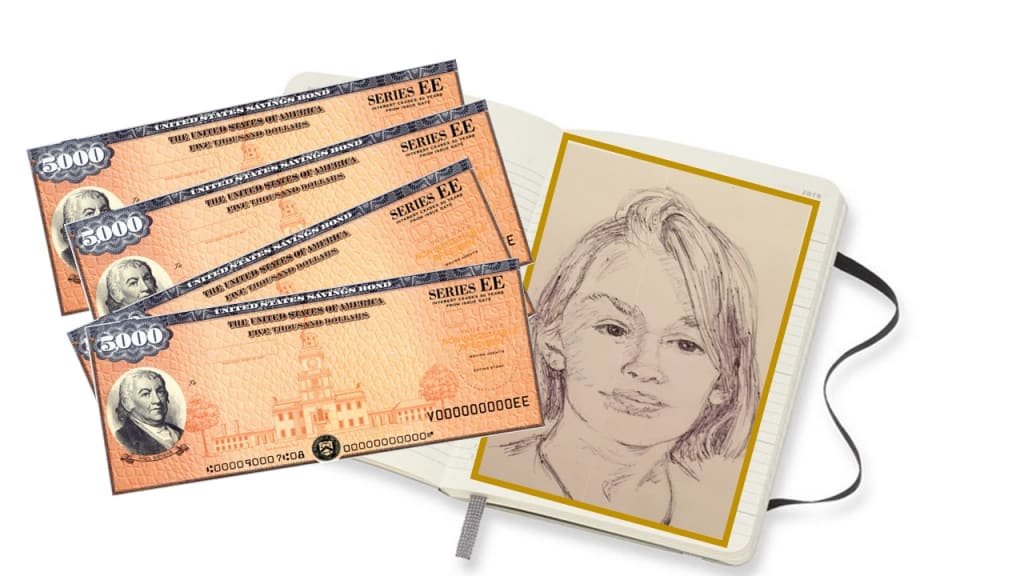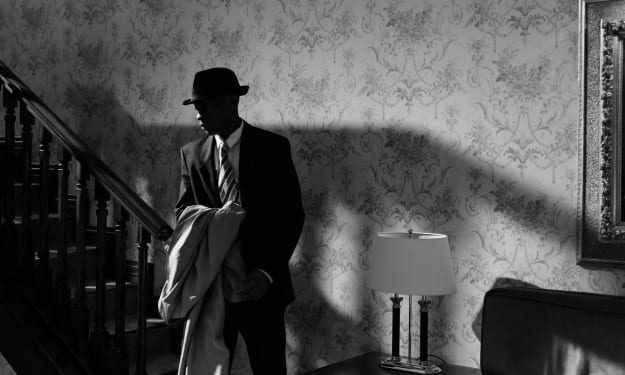
The suspect sat at a small interview table in hand cuffs, his matted hair and tangled beard making him look a decade older than he really was. But the vacant gaze and the dark circles under his eyes magnified the sense of exhaustion and failure emanating from his grizzled features.
Looking through the two-way mirror, the lieutenant said, “I think we’re wasting our time with him, sir.”
“I’m not ready to let him go.”
“We’ll need to charge him with something other than vagrancy in order to hold him. If he had a decent lawyer, he would force the issue.”
“It’s a good thing he doesn’t want a lawyer, then, isn’t it? We can still hold him ten more hours on the vagrancy charge. We need answers. The stockyard murders are already a month old.” The chief poked the lieutenant just below his name tag for emphasis. “Get him to talk. You and I both know he can tell us what really happened there.”
After the chief left the viewing room, a detective joined the lieutenant. “Boss, I got the para that spoke to the suspect at the scene and the line-up is ready.”
“Grab the suspect then, we can reinterview the para afterwards.”
Two days earlier, the suspect was still free as he gazed blankly down a line of cars waiting at a red light on the north end of town. “You don’t know me,” he whispered grimly to himself, “but I know you.”
“I was you.”
But as he shambled slowly past the idling cars the drivers looked at their phones or pretended to change channels on the radio, his cardboard sign unnoticed and unread. His eyes scanning for opened windows or trouble, he mumbled, “Don’t ever march home the same way,” but his lips hardly moved at all.
He had worked this light yesterday and made almost a hundred dollars. He knew working it two days in a row was a mistake, but he needed the money if he was going to travel three-hundred miles south. He had almost made up his mind to not press his luck any further when he heard a voice yelling behind him.
“Hey … shit bird! Nobody wants to see you around here. Get lost!”
Turning he saw a young man with a shaved head leaning out his car window. But the light had turned, and someone beeped angrily, the man’s head disappearing back into the car as he gunned it toward the intersection and executed a sloppy, skidding u-turn. Leaning out the window again, he slowed down to accost the man with the cardboard sign, but he had already slipped through the waiting cars and disappeared into the trees on the opposite side of the road.
“Every night you’ll be told where to meet if surrounded by a superior force,” he muttered, breathing heavily as he jogged through the small patch of woodland. But soon multiple deadfalls and tangles of thorny wait a minute vines forced him to make the first of several detours. Eventually he came to the rally point where he had cached his rucksack in an old hickory that morning.
Ten minutes later, he rested in a crook twenty-five feet up in the tree, his forest pattern camouflage blending with his leafy surroundings. If an enemy patrol entered the glade below, they would never spot him.
A patient man, he waited silently for over an hour, before slipping his hand into the ruck and withdrawing a small, black Moleskine notebook from a protective plastic baggy. On its inside front cover were Roger’s Rangers Standing Orders neatly printed in small black lettering. He smiled as he read the first one “Don’t forget nothing.” ‘Damn right,’ he thought.
Opening the book to its center, his eyes were moist as he starred at the drawing of his patrol buddy’s daughter. He remembered the final moments before the medics arrived the night when David pressed the little book into his hand.
“For Lexy,” he had whispered hoarsely.
The detectives removed the cuffs before placing him in the middle of a five-man line-up. The detective had arranged four homeless men to flesh out the rest of the line-up with a promise of lunch. He had hoped that one of them might recognize the suspect, but they all stood together with shoulders slumped and eyes glazed over. ‘They’re all pathetic,’ the detective thought, ‘every Jack one of them.’
After a couple of minutes, the para said, “I’m sorry, but it was dark. None of them look too familiar. Maybe if I could hear his voice.”
As the para sat in the lieutenant’s office, he listened to a recording of the suspect giving his name, rank, and serial number over and over again. But his voice was not too familiar either.
“I know you’ve already provided a statement about the events of the night in question, but would you mind sharing it again?
“Sure, anything to help. We arrived based on a 911 report of a shooting and found the first victim on the ground as the suspect was administering epinephrine. It probably saved his life.”
“Any idea where he got an Epi-Pen from?”
“Who knows? Allergies to bee stings or something else that could trigger anaphylaxis, I suppose. He might have even carried it for years.”
The detective wrote a quick note and passed it to the detective who then left the office. “Please continue.”
“As the other two medics worked to stabilize the shooting victim, I checked the vitals of two others at the site, but they were already dead. I asked the suspect what happened, and he said, ‘They shot David.’
“I pointed at the bodies and said not David … them. But he just shrugged and mumbled, ‘Enemy.’ He clammed up after that.
“After we loaded David in the ambulance, I told him to wait for the police and he nodded.”
“Do you remember what he was wearing?”
“Like I said, it was pretty dark. It looked like he had on a black hoody. So did David - come to think of it. Maybe it’s David’s clothes that I remember. I’m sorry, that’s not very helpful is it?”
The lieutenant shook his head, but thanked him for his time, anyway.
When the detective returned, he said, “I’ve requested the suspect’s military health records, boss, but we won’t get them today. We might not even get them this month.”
“I figured. Do me a favor and get the pistol parts found at the scene and bring them to the interview room. I want to see if it will jog the suspect’s memory.
The suspect, alone again in the interview room, wasn’t too concerned about the detectives. He was worried about David but knew better than to ask them how he was. That was just the sort of trap the enemy would set for him if he was not careful.
When the lieutenant and the detective returned to the room, they laid out the parts of a disassembled pistol on the table. They weren’t interested in David at all. Truth was, they had long before categorized all of the homeless they were forced to deal with as nonpersons.
The detective asked him conversationally if he could tell them what was missing. Leaning forward, the suspect spoke in a sudden, rapid cadence, naming each part on the table: “Slide and barrel assembly, receiver, magazine, recoil spring, recoil guide, slide and barrel assembly,” and then he paused before leaning back against the chair back. “It won’t fire without the firing pin.”
“Do you know how to field strip an M9 Beretta?” The lieutenant asked him.
“Yes.”
“And why, exactly, would you know that?”
“I carried one in Afghanistan.”
“But you were enlisted – a Sergeant, or so you keep telling us. I thought lower enlisted carried assault rifles.”
“I carried both. I was a Special Forces Medical Sergeant.”
“Why would you carry both?”
“It’s hard to defend yourself with a rifle when treating wounded soldiers.”
“Ever kill anyone, Sergeant? In Afghanistan, I mean.”
“My job description was life-saving, not killing.”
“But that doesn’t really answer the question, does it?”
The suspect’s eyes were suddenly bright with anger, as if the fog-like daze that cloaked him suddenly parted. “Ever kill anyone, Lie – u – tenant?”
They worked on him for several more hours, but in the end they let him go and assigned a couple undercover police to tail him.
He spotted the tail because he expected it. “If somebody’s trailing you,” he mumbled as he walked, “make a circle, come back onto your own tracks.” But he shook his head as if having a conversation with an unseen comrade. “Never take a chance you don’t have to. Maybe a diversion?”
“He returned to the intersection where he had enjoyed success three days before, but without his sign, since it was still cached with his rucksack in the old hickory.
The undercover cops watched him uneasily, both experienced enough to recognize as the minutes turned to hours that their cover was probably blown. After the sun dipped below the horizon, they kept expecting him to use the coming darkness to break contact, but he continued to work the cars even as the twilight blue slowly faded to black.
As it grew darker, they had begun to move closer to the suspect in case he made a sudden dash from the intersection. Consequently, they were close enough to hear the sudden slamming of a car door and a man’s voice yelling.
“What part of nobody wants to see you here didn’t you understand?”
“Shit, he’s got a gun,” one cop said to the other, and they both drew their pistols. “Drop your weapon, police!” they yelled.
But the man with the shaved head did not have the gun anymore. The suspect snatched it from his hand before he even had a chance to point it properly and threaded his way through the traffic field stripping the pistol as he trotted. “Magazine and chambered round,” he said mechanically, naming each part of the pistol as they bounced across the asphalt till his hands were empty and he had disappeared into the tree line.
It took him much longer to make his way to the hickory this time. But once he located the tree and climbed into his hide, multiple flashlights began to bob among the trees as a helicopter with a spotlight flew overhead. They worked his patch of woods for hours without finding him.
He got up before dawn and slipped out of the woods while it was still dark. Behind a McDonald’s he pulled a pair of rolled up slacks out of his rucksack, a polo shirt, and a pair of black dress shoes, changing in the darkness. The clothes that he wore when the police had arrested him, he tossed in the dumpster with the empty rucksack, and stashed his few remaining belongings in a collapsible bag with the little black book and four $5,000 double-E bonds that David handed him with the little black book.
Once the McDonald’s opened, he slipped in the side door and went to the men’s rest room. With a pair of battery-operated trimmers, he shaved his head and beard, and gave himself a clean shave with a disposable razor using the soap from the bathroom dispenser. When he left fifteen minutes later, those who nodded at him as he strode by could never have imagined who he really was.
As he opened the door and stepped into the early morning light, he whispered “For Lexy.” And then he stood smiling for a moment, enjoying the feel of the warmth on his freshly shaved face.
‘I had better get going,’ he thought, ‘I have a long way still to go.’






Comments (2)
Is there a part two to this 😁
Hi John ~ I can so relate - fer-real ~ Jay Kantor, Vocal Village Community